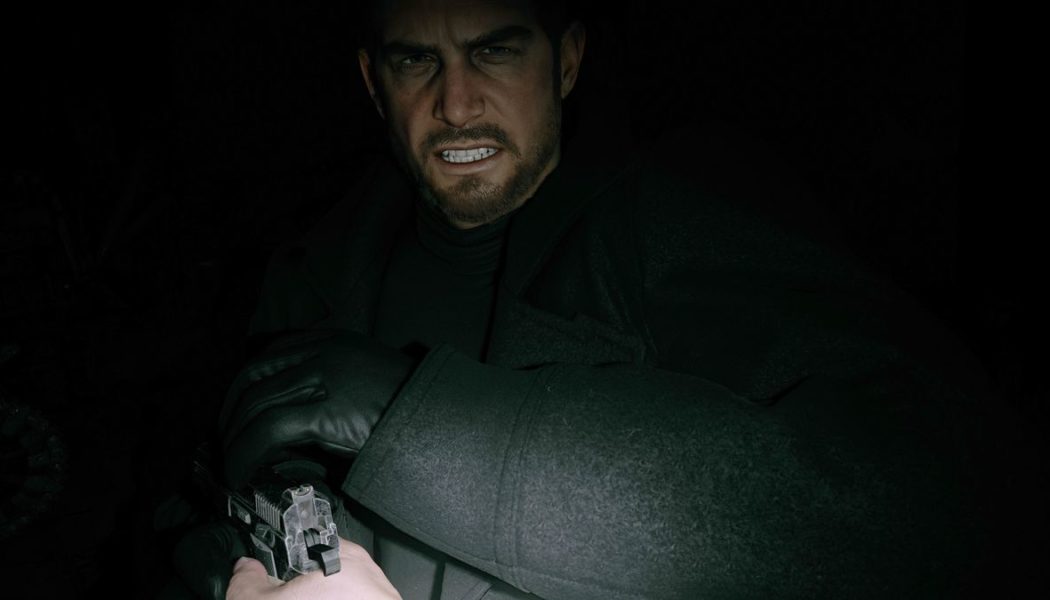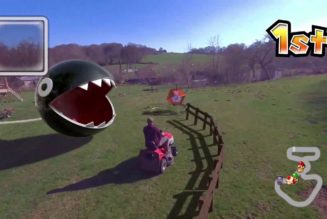Resident Evil has been in a pretty good place of late. After reaching its possible creative nadir with Resident Evil 6, 2017’s Resident Evil 7 represented a welcome return to the series’ horror roots while reinventing itself with a first-person perspective. Since then, Capcom has put out a phenomenally good remake of Resident Evil 2, as well as a solid if less substantial take on its successor.
Now we have Resident Evil Village, which comes with a logo styled in a way to let you know that this is really Resident Evil 8, even if Capcom isn’t explicitly naming it as such. It’s a direct sequel to 7, with the same first-person perspective and bland protagonist Ethan Winters. But while 7 evoked the slow-burning housebound horror of the original game, Village is more like a first-person take on arguably the series’ highest point: Resident Evil 4.
Village picks up a few years after the events of Resident Evil 7. Ethan and his wife Mia have moved to Europe and are raising their baby, but things quickly go south following an intervention from series icon Chris Redfield. Ethan finds himself in a hostile village populated by savage werewolf-adjacent people and sets out to find his daughter.
While Village shares a camera angle and basic controls with 7, the tone is notably different right from the start. Instead of tentatively exploring a creepy, atmospheric environment that gradually reveals the horror within, you’re thrown right into the thick of the action and are left to fend for yourself against warped antagonists — which, you may remember, is exactly how Resident Evil 4 started out.
:no_upscale()/cdn.vox-cdn.com/uploads/chorus_asset/file/22493142/RE_Village_Apr_2021_Screens_13.jpg)
Village’s similarities to 4 go further than its breakneck opening and rural European setting. It’s a much more action-oriented game than 7, and you’ll often find yourself taking on several enemies at once. Capcom has also made a lot of quality-of-life tweaks that give the game a breezier feel, from a shortcut that lets you break boxes without equipping your knife to an overhauled inventory system that separates crafting materials from everything else, giving you more space and firepower.
I found Village’s shift in tone a little surprising after the broad success of Resident Evil 7. That game was widely lauded for its relatively grounded return to survival horror — at least, about as grounded as you can get when you’re making a game involving horrifically mutated monsters caused by shadowy bioweapon experiments. The setting — mostly centered on a disgusting, fetid house in a Louisiana bayou — was evocative and terrifying, marking the first time in a while that a Resident Evil game would genuinely make you fear what might be around the next corner.
Save for a couple of notable sequences, Village mostly throws that idea away. The village itself is a fairly open space that you explore in the daytime, solving environmental puzzles in order to unlock further areas. It can be a little confusing to navigate at first, but it’s not particularly large, and eventually its main function is to serve as a hub from which you set out to take down four lords in thrall to a mysterious figure known as Mother Miranda. The first and most striking of these locations is Castle Dimitrescu, home to the nine-foot-tall Lady Dimitrescu, who stalks you around the place in a similar fashion to prior Resident Evil villains like Nemesis.
Castle Dimitrescu is classic Resident Evil, and the game settles into a familiar rhythm of locked doors, light puzzles, and little-by-little progression as you uncover more of the map. This loop is as satisfying as it’s ever been, but unlike in Resident Evil 7, I rarely found it to be scary because of the greater focus on action. There’s only so much tension that can build up when you’re using your shotgun this often. And that holds for most of the rest of the game, as you travel to new areas that largely serve as theatrical preludes to showdowns with Miranda’s other followers.
Speaking of those showdowns, the boss fights in Village are one of the more notable improvements over its predecessor. Most of Resident Evil 7’s fights were frustrating and unsatisfying, but Capcom has embraced spectacle to great effect for Village’s biggest battles. They’re not necessarily titanic challenges or complex brain-teasers, but they’re at least memorable, and that’s a good start.
:no_upscale()/cdn.vox-cdn.com/uploads/chorus_asset/file/22493149/RE_Village_Apr_2021_Screens_09.jpg)
Village has its atmospheric moments, to be sure, but they’re not the main event. There are lengthy sections of the game that are structured more or less like a first-person shooter. The puzzles are mostly straightforward, and you’ll rarely find yourself without the means to fight back against enemies. There’s nothing quite as bombastic as the worst excesses of 5 or 6, and there’s one encounter in particular that leans hard into psychological horror, but Village sometimes feels more like something from the Metro series than any of its own predecessors.
Resident Evil 4 was controversial in its own time, of course, with some longtime series fans bemoaning its similar shift away from survival horror. Now it’s considered one of the most revolutionary action games of all time. But Village doesn’t have that going for it. While it takes heavy inspiration from 4, it’s still mostly an iteration on 7, and the result is just another remixed Resident Evil.
Resident Evil Village is a good game worth playing, and I think it’s very much a solid numbered entry in the series even if Capcom doesn’t want to call it one. But by transparently blending elements of 7 and 4, two of the most dramatic overhauls in series history, it feels less noteworthy than either. As such, the way you feel about it is likely to come down to how you feel about Resident Evil overall.
If you’re in it for the outlandish characters and labyrinthine level design, you’ll probably love Village. If you’d hoped 7 would spark a fresh new direction for the series, though, you might be disappointed.
Resident Evil Village launches on May 7th on the PS4, PS5, Xbox One, Xbox Series X, Steam, and Stadia.









